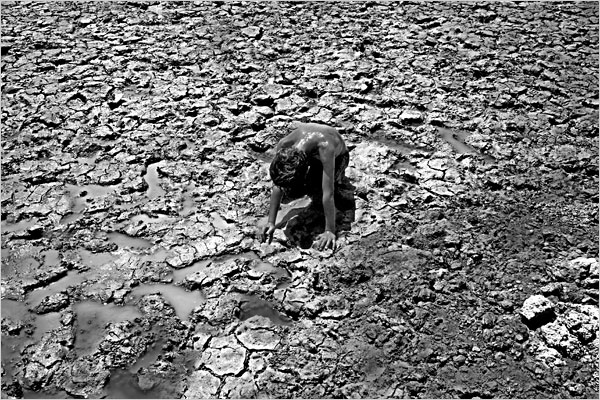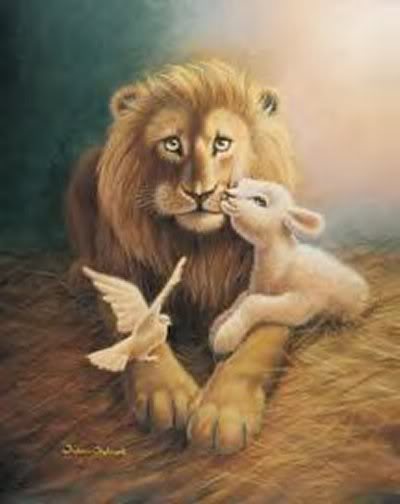The Euphrates is Drying Up
Many liberals all over the world scoff at Christians who believe in the Word of God and value it as a major resource for knowing what will take place in this world. Christians are not prognosticators as some in the secular world claim to be. We don't sit with our backs ramrod straight and our thumbs and middle fingers pressed together while moaning, "OHHMMMM." Neither do spew forth the "wisdom of the ages" received while in "another state of mind." The Living Word of God is our "enlightenment." It was given to us by God through man; and we can sit, lay down, stand up, or hang from a tree branch (as THEIR ancestors did) and still get the same message. Yes, the Bible is full of prophets. I even believe we have legitimate prophets speaking for the Lord in this day, but our revelation comes from God, not the netherworld through mantras or meditaion that takes us away from reality.
You see, what we claim as prophecy from God in His Bible is true! It happens! How many of Jean Dixson's prophecies came true? From what I read of her, she was right about 2% of the time. In Bible times, when these prophecies were written, the prophet had to be 100% right or he was not "feared" (respected; listened to [Deuteronomy 18:22]). Dixon, Cassey and countless others have a poor track record, and yet, they still command a following to this day.
Unlike those false prophets, everything that has been told us by God through the mouths of His prophets has happened, or is happening now. Amazing that those Jews from 3,000 or more years ago knew what we would be living through in 2009!
Now another old prophecy is reaching fulfillment even as I write this. What really makes this newsworthy is that the very liberal New York Times carried this article which was written by Campbell Robertson and published July 13, 2009. That prophecy is that the Euphrates River is drying up. How does that fit in the scheme of things for today's Christians and the world? Let me show you from Scripture (the Bible).
The mention of the Euphrates begins in Genesis with these words:
This river has been running since the beginning of time as we know it. It was part of one great river that God separated into four individual rivers that were to water the Garden of Eden where ADAM and EVE lived and began their family.
The Euphrates has always been called "the great river" by God. It was part of the inheritance He gave to Abram's children. (Abram later became the more famous Abraham [Genesis 17:5]) "In the same day the LORD made a covenant with Abram, saying, Unto thy seed have I given this land, from the river of Egypt unto the great river, the river Euphrates..." (Genesis 15:18) God didn't only say it once, either. God told the Israelites that if they loved Him and obeyed His commandments, that, "Every place whereon the soles of your feet shall tread shall be yours: from the wilderness and Lebanon, from the river, the river Euphrates, even unto the uttermost sea shall your coast be (Deuteronomy 11:24) .
From these Scriptures, we can see this whole "land for peace" idea is bogus as the land belongs to Israel by covenant with God. He gave them the lands to use as long as they obeyed Him. What they have lost, they lost through their own disobedience. What they have left is God's mercy on them and we have absolutely no right to ask or demand they give it away to their sworn mortal enemies.
Anyone reading the Old Testament and Revelation will come to know the importance of the "Great River Euphrates" to the future of Israel. "And the sixth angel poured out his vial upon the great river Euphrates; and the water thereof was dried up, that the way of the kings of the east might be prepared" (Revelation 16:12). During the Tribulation that will follow the Rapture, or "catching away" of the dead in Christ and the saints of the church, the Euphrates will make a dry pass-over land for the armies that will come to face the Battle of Armeggedon. (Revelation 16:14,16)
How can a river so huge suddenly become dry? Read the following article and see how God has done exactly what He had man prophecy.
Signs of the end? Euphrates River drying up
--------------------------------------------------------------------------------
Throughout the marshes, the reed gatherers, standing on land they once floated over, cry out to visitors in a passing boat.
“Maaku mai!” they shout, holding up their rusty sickles. “There is no water!”
The Euphrates is drying up. Strangled by the water policies of Iraq’s neighbors, Turkey and Syria; a two-year drought; and years of misuse by Iraq and its farmers, the river is significantly smaller than it was just a few years ago. Some officials worry that it could soon be half of what it is now.
The shrinking of the Euphrates, a river so crucial to the birth of civilization that the Book of Revelation prophesied its drying up as a sign of the end times, has decimated farms along its banks, has left fishermen impoverished and has depleted riverside towns as farmers flee to the cities looking for work.
The poor suffer more acutely, but all strata of society are feeling the effects: sheiks, diplomats and even members of Parliament who retreat to their farms after weeks in Baghdad.
Along the river, rice and wheat fields have turned to baked dirt. Canals have dwindled to shallow streams, and fishing boats sit on dry land. Pumps meant to feed water treatment plants dangle pointlessly over brown puddles.
“The old men say it’s the worst they remember,” said Sayid Diyia, 34, a fisherman in Hindiya, sitting in a riverside cafe full of his idle colleagues. “I’m depending on God’s blessings.”
The drought is widespread in Iraq. The area sown with wheat and barley in the rain-fed north is down roughly 95 percent from the usual, and the date palm and citrus orchards of the east are parched. For two years rainfall has been far below normal, leaving the reservoirs dry, and American officials predict that wheat and barley output will be a little over half of what it was two years ago.
It is a crisis that threatens the roots of Iraq’s identity, not only as the land between two rivers but as a nation that was once the largest exporter of dates in the world, that once supplied German beer with barley and that takes patriotic pride in its expensive Anbar rice.
Now Iraq is importing more and more grain. Farmers along the Euphrates say, with anger and despair, that they may have to abandon Anbar rice for cheaper varieties.
Droughts are not rare in Iraq, though officials say they have been more frequent in recent years. But drought is only part of what is choking the Euphrates and its larger, healthier twin, the Tigris.
The most frequently cited culprits are the Turkish and Syrian governments. Iraq has plenty of water, but it is a downstream country. There are at least seven dams on the Euphrates in Turkey and Syria, according to Iraqi water officials, and with no treaties or agreements, the Iraqi government is reduced to begging its neighbors for water.
At a conference in Baghdad — where participants drank bottled water from Saudi Arabia, a country with a fraction of Iraq’s fresh water — officials spoke of disaster.
“We have a real thirst in Iraq,” said Ali Baban, the minister of planning. “Our agriculture is going to die, our cities are going to wilt, and no state can keep quiet in such a situation.”
Recently, the Water Ministry announced that Turkey had doubled the water flow into the Euphrates, salvaging the planting phase of the rice season in some areas.
That move increased water flow to about 60 percent of its average, just enough to cover half of the irrigation requirements for the summer rice season. Though Turkey has agreed to keep this up and even increase it, there is no commitment binding the country to do so.
With the Euphrates showing few signs of increasing health, bitterness over Iraq’s water threatens to be a source of tension for months or even years to come between Iraq and its neighbors. Many American, Turkish and even Iraqi officials, disregarding the accusations as election-year posturing, say the real problem lies in Iraq’s own deplorable water management policies.
“There used to be water everywhere,” said Abduredha Joda, 40, sitting in his reed hut on a dry, rocky plot of land outside Karbala. Mr. Joda, who describes his dire circumstances with a tired smile, grew up near Basra but fled to Baghdad when Saddam Hussein drained the great marshes of southern Iraq in retaliation for the 1991 Shiite uprising. He came to Karbala in 2004 to fish and raise water buffaloes in the lush wetlands there that remind him of his home.
“This year it’s just a desert,” he said.
Along the river, there is no shortage of resentment at the Turks and Syrians. But there is also resentment at the Americans, Kurds, Iranians and the Iraqi government, all of whom are blamed. Scarcity makes foes of everyone.
The Sunni areas upriver seem to have enough water, Mr. Joda observed, a comment heavy with implication.
Officials say nothing will improve if Iraq does not seriously address its own water policies and its history of flawed water management. Leaky canals and wasteful irrigation practices squander the water, and poor drainage leaves fields so salty from evaporated water that women and children dredge huge white mounds from sitting pools of runoff.
On a scorching morning in Diwaniya, Bashia Mohammed, 60, was working in a drainage pool by the highway gathering salt, her family’s only source of income now that its rice farm has dried up. But the dead farm was not the real crisis.
“There’s no water in the river that we drink from,” she said, referring to a channel that flows from the Euphrates. “It’s now totally dry, and it contains sewage water. They dig wells but sometimes the water just cuts out and we have to drink from the river. All my kids are sick because of the water.”
In the southeast, where the Euphrates nears the end of its 1,730-mile journey and mingles with the less salty waters of the Tigris before emptying into the Persian Gulf, the situation is grave. The marshes there that were intentionally reflooded in 2003, rescuing the ancient culture of the marsh Arabs, are drying up again. Sheep graze on land in the middle of the river.
The farmers, reed gatherers and buffalo herders keep working, but they say they cannot continue if the water stays like this.
“Next winter will be the final chance,” said Hashem Hilead Shehi, a 73-year-old farmer who lives in a bone-dry village west of the marshes. “If we are not able to plant, then all of the families will leave.”

